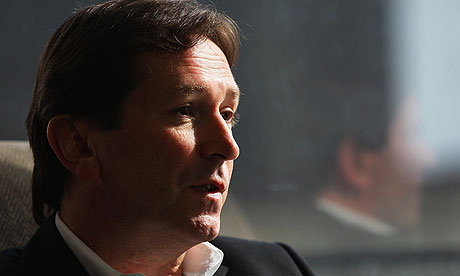
England's leading clubs have launched a scathing attack on the Rugby Football Union, questioning the judgment of senior union management and revealing they have apologised to New Zealand officials "on behalf of the English game" for the conduct of their country's players during the World Cup.
Premier Rugby Ltd, which represents the Aviva Premiership clubs, has reacted angrily to the RFU's insistence that an independent review conducted by Fran Cotton will outweigh the formal report due to be compiled by the Professional Game Board, a body that includes club and players' union representatives.
"The union has to ask themselves seriously if that kind of [independent] report will hold any credibility," said Mark McCafferty, PRL's chief executive, concerned that Cotton has already made public criticisms of the players and the team manager, Martin Johnson. "We don't have any issues with Fran as an individual but … in most walks of life that would immediately eliminate you from any ability to run that sort of inquiry independently."
The clubs also believe that the RFU's acting chief executive, Martyn Thomas, should have consulted them before commissioning the Cotton review. The battle lines are now drawn for a major showdown at the RFU council meeting on 2 December, when members will be asked to consider two potentially different recommendations.
"To us it beggars belief how the union has seemingly been reacting on a short-term basis over the last six-to-nine months," McCafferty said. "The game has to realise that the professional game has to be run by professionals, end of story."
The Professional Game Board's own report, which will include a detailed player questionnaire, is due to be debated on 17 November and then presented to the RFU's management board. Time is short as, ideally, England need to have a coaching team in place in December who can select an elite player squad on 1 January, in preparation for the Six Nations.
"What's important is that the review is done properly and fairly," Quentin Smith, the chairman of PRL, said. "It affects people's lives and jobs, it affects the commercial trading of a number of businesses and it affects stakeholders around the world committed to the game of rugby."
Smith, who said the RFU was guilty of "panic management", also questioned Thomas's public ultimatum to Johnson, who has been asked to indicate whether he wishes to remain at the helm by Monday week. "I know of no employment law giving an employee 14 days to declare their interest," Smith said. "I'm not clear why any of that is in the public domain."
McCafferty, for his part, believes the RFU's current senior management are under increasing pressure. "What will the RFU do when the PGB makes its recommendations on 17 November? Is it going to say: 'That's fine but forget about it.' I don't think the game in England will accept that any more.
"The RFU council, in my view, is going to have to make its judgment on 2 December about who it follows. Would you entrust the future of the game to what's gone on over the last six months or so? I think the game is coming to that decision point."
The clubs also argue that England's off-field turmoil is "inseparable" from the disappointing performances on it and ensured "the worst possible backdrop" to their World Cup campaign, which suffered a further indignity when Courtney Lawes became the third member of the squad to be fined for wearing a branded mouthguard during the tournament.
McCafferty and Smith even felt the need to apologise to senior local officials for the players' off-field behaviour. "Mark and I found the opportunity to apologise to Mike Eagle and Steve Tew, the chairman and chief executive of the New Zealand Rugby Football Union, for what has happened here on behalf of England," Smith said.
"They do not have any right to have such a wonderful tournament tarnished by bad publicity and bad behaviour. We apologised on behalf of the English game and apologised for the lack of contrition by others. It was extremely well received and we were thanked for that."

